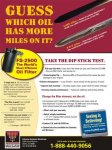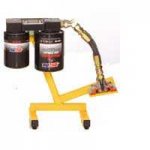Ken, I respect your technical knowledge, but I have to disagree with you when you say your stock Deuce filtration is "working just fine". Barely adequate maybe, just fine, I don't think so. I know you'd like to "bypass" this subject, but I think we need a "full flow" of discussion here, before we "spin off" on another topic. While I know you are technically astute, some of the readers following this thread may not be, so I will talking in simple, basic terminology, not to affront you, but to assist less astute readers. Certainly, the filtration system has worked somewhat efficiently since 1949 when the Deuce was originally designed, but IMHO the stock Deuce filtration system sucks, for two basic reasons.
1. The upside down cannisters which allow oil to drain back into the crankcase, resulting in a "dry start" after the engine has been sitting for a while. Bypass filters do not address this issue, I do have some ideas which I will try and report in a later post.
2. The cellulose filtration media (read "paper") does not do a great job of filtration.
Change your oil, pull the dipstick, and what do you see? Clear, honey colored oil. Rub some between your fingers, what does it feel like? Smooth and slick. Then run the engine a while, check the dipstick, and what do you have? Black, opaque, gritty oil. The difference is soot, unburned carbon particles which have made their way past the piston rings and into the oil. Soot particles are generally in the 5-60 micron range in size. A typical cellulose filter can trap particles down to 50-100 microns, a quality glass fiber filter a little better.
To put this in perspective, a grain of salt or a grain of fine sand is in the 40-60 micron size range. These particles pass through a typical full flow filter unimpeded. In terms of your engine's lubrication needs, a full flow filter stops the bolts, nuts, twigs and large boulders which might plug a lubrication passage and cause catastrophic engine failure, but do nothing to stop the fine grit which causes most engine wear.
The oil film between the crankshaft and its bearings, the camshaft and its bearings, and the piston skirt and rings and the cylinder wall is in the 20-40 micron range. The typical filtration system passes particulates which exceed the lubrication film thickness - essentially pumping abrasives in the oil which are larger than the protective lubrication film. The result - micro particles of cadmium and copper from the bearings, aluminum from the pistons, iron from the cylinders, and steel from the rings, crankshaft and camshaft are being constantly ground off and end up in the engine oil.
A bypass filter is designed to tap off a portion of the oil flow, usually 10% or so, through a high efficiency particulate filter, typically removing 99% of all particulate 1 micron or smaller, and returning the cleaned oil to the crankcase. Typically, after an hour or so, 100% of the engine oil has passed through the bypass filter, and essentially all particulate has been removed from the oil.
The end result - using a bypass filter, all significant particulate matter is removed from the engine oil, and you are running on "clean" engine oil all the time. Bearing, crankshaft, camshaft, cylinder, piston and piston ring wear are reduced significantly , to near zero levels.
Right now I have a lot on my Deuce's to do list - install pyrometer and boost gauges, replace a leaking knuckle boot, and a few other repairs. Once that is done I have to do an oil change, run it for a while with new oil until it gets grundgy, and then I'll install a bypass filter. I'll do an oil analysis of the old oil, the new oil after it has been run a while, and again after the new oil has been run with the bypass filter in place long enough to do what it is supposed to do. I'll post the results here and you can draw you own conclusions. I just hope the bypass filter works as well as advertised. This will probably take a couple of months before all the testing is done, so please be patient!
I'm not really concerned about extended oil changes, at 5-10K annual mileage on my Deuce, I'll do at least an annual oil and filter change anyhow. It is the claimed 90% reducttion in engine wear that has my interest!



